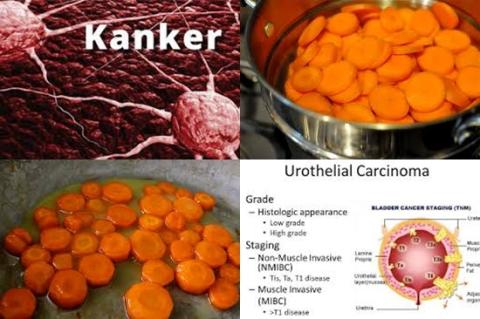
Objectives:
Previous studies regarding the relationship between carrot intake and risk of urothelial cancer have reported conflicting results. Therefore, this review article (meta-analysis) has been conducted.
Does a high consumption of carrot reduce urothelial cancer risk?
Study design:
This review article included a total of 6 epidemiological studies (4 case-control and 2 cohort studies) with 1,523 urothelial cancer cases.
There was no significant publication bias by Begg's test (p = 0.348) or Egger's test (p = 0.130).
Results and conclusions:
The investigators found overall analysis indicated a significantly reduced risk of 37% for urothelial cancer for high intake of carrot [OR = 0.63, 95% CI = 0.44-0.90, I2 = 79.6%, p 0.001].
The investigators found in the subgroup analysis by study design, a significantly reduced risk of 55% for urothelial cancer in case-control studies [OR = 0.45, 95% CI = 0.25-0.81]. However, this reduced risk was not significant in cohort studies [OR = 0.91, 95% CI = 0.67-1.24].
Not significant because OR of 1 was found in the 95% CI of 0.67 to 1.24. OR of 1 means no risk/association.
The investigators found, when separately analyzed by carrot type, a significantly reduced risk of 31% for cooked carrot [OR = 0.69, 95% CI 0.51-0.94], but the reduced risk was not significant for raw carrot [OR = 0.84, 95% CI = 0.37-1.93].
The investigators found in the stratified analysis by geographical region, a non-significantly reduced risk of 38% [OR = 0.62, 95% CI = 0.37-1.06], a non-significantly reduced risk of 30% [OR = 0.70, 95% CI = 0.29-1.67] and a non-significantly reduced risk of 47% [OR = 0.53, 95% CI = 0.22-1.26] for Europe, Asia and USA, respectively.
The investigators also found a non-significantly reduced risk of 44% [OR = 0.56, 95% CI = 0.27-1.17] and a non-significantly reduced risk of 27% [OR = 0.73, 95% CI = 0.12-4.60] for male and female, respectively.
The investigators concluded that a high intake of carrot might be associated with a low incidence of urothelial cancer. Might be associated because the reduced risk was not significant in cohort studies. Considering the limited included studies and huge heterogeneity, further large well-designed prospective cohort studies are warranted to confirm these findings.
Original title:
Carrot intake and incidence of urothelial cancer: a systematic review and meta-analysis by Luo X, Lu H, [...], Wang S.
Link:
https://www.ncbi.nlm.nih.gov/pmc/articles/PMC5652827/
Additional information of El Mondo:
Find more information/studies on carrot consumption, randomized controlled trials/cohort studies/subgroup analysis and cancer right here.